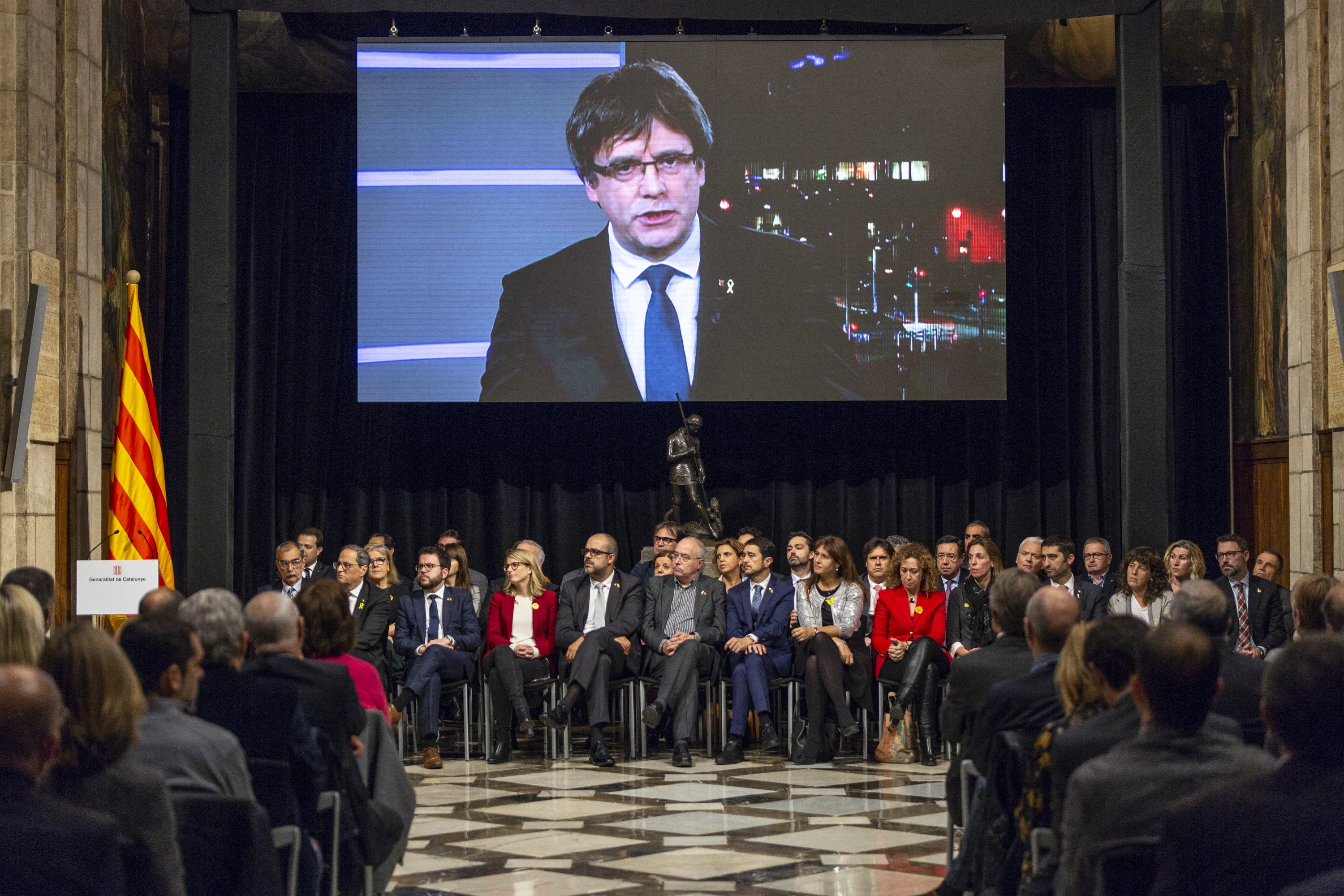The Catalan Council for the Republic was presented this Tuesday evening in the government palace's Saint George room in a ceremony heavily loaded with symbolism, not least because it comes a year after president Carles Puigdemont and members of his government left into exile. Quim Torra's executive wanted to make the event an act of recognition of what it defends as the legitimate government of Catalonia: "This is your house, which democracy sent to you and from which only has repression been able to remove you". During his speech, by video link from Brussels, Puigdemont announced the immediate creation of a public register for people to take part in the Council.
Outside the palace, in plaça Sant Jaume, hundreds of people followed the ceremony on a large screen that had been set up. Inside the palace, the Saint George room, the most solemn space in the building, reserved for swearing-in ceremonies and events of special significance, the event was attended by representatives and deputies from JxCat, PDeCAT, ERC and CUP, as well as ministers and senior government officials, mayors and representatives of the pro-independence organisations. At different times, applause from the square outside could be heard.
Public register
"The Council has to act in coordination with the other actors without the pressure of an authoritarian state", said Puigdemont. He specifically mentioned debates on methods of participation, democratic legality, active participation in a cross-spectrum and plural constitutional process, as well as the need to increase the internationalisation of the Catalan issue.
"The Council is and will be a space of coordination, of participation, which will count with civic bodies to assume the challenge of a republic, which counts from the very beginning with the people's participation", he said, for which reason they've opened this register of people who are interested in taking part.
Puigdemont emphasised that the Council has to work in the most free way possible, without complexes, protected from the state's abuses, without restraints or threats.
Won't accept the verdicts
President Quim Torra said that the creation of the Council is a response to the wish to construct a republic of a people who have decided to leave behind discrimination, dependency and submission. "We haven't come here to remake our autonomy in a state and a monarchy which we Catalans don't consider our own," he said.
In this framework, the president insisted that the government will not accept any verdict other than acquittal in the trial of the pro-independence leaders: "We won't accept anything other than the return of the exiles. It's not a question of politics, nor of independence, it's a question of staying faithful to our democratic ideals".
Another actor
Minister Toni Comín explained that on 1st October, the day of the referendum, Catalans went to vote and exercise their right to self-determination (never had we exercised it as clearly as that day", he said. After that moment, "nothing can now be the same", but another actor is needed to enable the implementation of the republic. According to the minister, this actor has to support the institutions and the bodies in the "free space in Europe" so they can present themselves as custodians of the result of the referendum.
He insisted that it's this reason that makes the Council necessary and indispensable. "The Council will this time allow us to walk forwards and achieve our full liberty".
Recognition of the exceptional situation
The vice-president, Pere Aragonès, spoke first, denouncing the imprisonment and exile of members of the Catalan government, something he attributed to the state's revenge for the referendum. "We're living in an exceptional situation and the Council is born in this space to be a free space for the defence and internationalisation of the case of Catalonia," he said.
He said that the Council will operate with private funding, leaving it with the flexibility to work towards its objective in a ceremony with started with the projection of images of the proclamation of the republic on large screens.
"It's an act of recognition of the exceptional situation and the path that we're starting on today will only end with the liberation of the prisoners and the return of the exiles and a political solution which respects Catalonia's right to self-determination".

